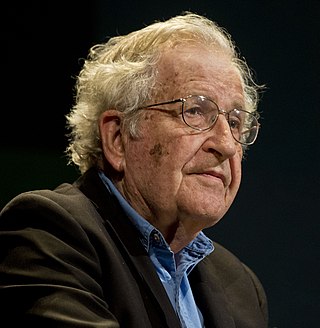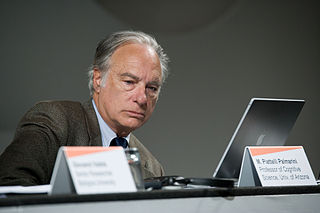Evolutionary linguistics or Darwinian linguistics is a sociobiological approach to the study of language. Evolutionary linguists consider linguistics as a subfield of sociobiology and evolutionary psychology. The approach is also closely linked with evolutionary anthropology, cognitive linguistics and biolinguistics. Studying languages as the products of nature, it is interested in the biological origin and development of language. Evolutionary linguistics is contrasted with humanistic approaches, especially structural linguistics.
The following outline is provided as an overview and topical guide to linguistics:

In linguistics, syntax is the study of how words and morphemes combine to form larger units such as phrases and sentences. Central concerns of syntax include word order, grammatical relations, hierarchical sentence structure (constituency), agreement, the nature of crosslinguistic variation, and the relationship between form and meaning (semantics). There are numerous approaches to syntax that differ in their central assumptions and goals.

Universal grammar (UG), in modern linguistics, is the theory of the innate biological component of the language faculty, usually credited to Noam Chomsky. The basic postulate of UG is that there are innate constraints on what the grammar of a possible human language could be. When linguistic stimuli are received in the course of language acquisition, children then adopt specific syntactic rules that conform to UG. The advocates of this theory emphasize and partially rely on the poverty of the stimulus (POS) argument and the existence of some universal properties of natural human languages. However, the latter has not been firmly established, as some linguists have argued languages are so diverse that such universality is rare, and the theory of universal grammar remains controversial among linguists.
In linguistics, transformational grammar (TG) or transformational-generative grammar (TGG) is part of the theory of generative grammar, especially of natural languages. It considers grammar to be a system of rules that generate exactly those combinations of words that form grammatical sentences in a given language and involves the use of defined operations to produce new sentences from existing ones.
Cognitive linguistics is an interdisciplinary branch of linguistics, combining knowledge and research from cognitive science, cognitive psychology, neuropsychology and linguistics. Models and theoretical accounts of cognitive linguistics are considered as psychologically real, and research in cognitive linguistics aims to help understand cognition in general and is seen as a road into the human mind.

Generative grammar, or generativism, is a linguistic theory that regards linguistics as the study of a hypothesised innate grammatical structure. It is a biological or biologistic modification of earlier structuralist theories of linguistics, deriving from logical syntax and glossematics. Generative grammar considers grammar as a system of rules that generates exactly those combinations of words that form grammatical sentences in a given language. It is a system of explicit rules that may apply repeatedly to generate an indefinite number of sentences which can be as long as one wants them to be. The difference from structural and functional models is that the object is base-generated within the verb phrase in generative grammar. This purportedly cognitive structure is thought of as being a part of a universal grammar, a syntactic structure which is caused by a genetic mutation in humans.
In linguistics, the minimalist program is a major line of inquiry that has been developing inside generative grammar since the early 1990s, starting with a 1993 paper by Noam Chomsky.

Ray Jackendoff is an American linguist. He is professor of philosophy, Seth Merrin Chair in the Humanities and, with Daniel Dennett, co-director of the Center for Cognitive Studies at Tufts University. He has always straddled the boundary between generative linguistics and cognitive linguistics, committed to both the existence of an innate universal grammar and to giving an account of language that is consistent with the current understanding of the human mind and cognition.

Syntactic Structures is an important work in linguistics by American linguist Noam Chomsky, originally published in 1957. A short monograph of about a hundred pages, it is recognized as one of the most significant and influential linguistic studies of the 20th century. It contains the now-famous sentence "Colorless green ideas sleep furiously", which Chomsky offered as an example of a grammatically correct sentence that has no discernible meaning, thus arguing for the independence of syntax from semantics.
In linguistics, linguistic competence is the system of unconscious knowledge that one knows when they know a language. It is distinguished from linguistic performance, which includes all other factors that allow one to use one's language in practice.
Generative semantics was a research program in theoretical linguistics which held that syntactic structures are computed on the basis of meanings rather than the other way around. Generative semantics developed out of transformational generative grammar in the mid-1960s, but stood in opposition to it. The period in which the two research programs coexisted was marked by intense and often personal clashes now known as the linguistics wars. Its proponents included Haj Ross, Paul Postal, James McCawley, and George Lakoff, who dubbed themselves "The Four Horsemen of the Apocalypse".

The term Cartesian linguistics was coined by Noam Chomsky in his book Cartesian Linguistics: A Chapter in the History of Rationalist Thought (1966). The adjective "Cartesian" pertains to René Descartes, a prominent 17th-century philosopher. As well as Descartes, Chomsky surveys other examples of rationalist thought in 17th-century linguistics, in particular the Port-Royal Grammar (1660), which foreshadows some of his own ideas concerning universal grammar.

Biolinguistics can be defined as the study of biology and the evolution of language. It is highly interdisciplinary as it is related to various fields such as biology, linguistics, psychology, anthropology, mathematics, and neurolinguistics to explain the formation of language. It is important as it seeks to yield a framework by which we can understand the fundamentals of the faculty of language. This field was first introduced by Massimo Piattelli-Palmarini, professor of Linguistics and Cognitive Science at the University of Arizona. It was first introduced in 1971, at an international meeting at the Massachusetts Institute of Technology (MIT). Biolinguistics, also called the biolinguistic enterprise or the biolinguistic approach, is believed to have its origins in Noam Chomsky's and Eric Lenneberg's work on language acquisition that began in the 1950s as a reaction to the then-dominant behaviorist paradigm. Fundamentally, biolinguistics challenges the view of human language acquisition as a behavior based on stimulus-response interactions and associations. Chomsky and Lenneberg militated against it by arguing for the innate knowledge of language. Chomsky in 1960s proposed the Language Acquisition Device (LAD) as a hypothetical tool for language acquisition that only humans are born with. Similarly, Lenneberg (1967) formulated the Critical Period Hypothesis, the main idea of which being that language acquisition is biologically constrained. These works were regarded as pioneers in the shaping of biolinguistic thought, in what was the beginning of a change in paradigm in the study of language.
The linguistics wars were a protracted academic dispute inside American theoretical linguistics that took place mostly in the 1960s and 1970s, stemming from an intellectual falling out between Noam Chomsky and some of his early colleagues and doctoral students. The debate began in 1967, when linguists Paul Postal, "Haj" Ross, George Lakoff, and James McCawley—self-dubbed the "Four Horsemen of the Apocalypse" —proposed an approach to the relationship between syntax and semantics, which treated deep structures as meanings rather than syntactic objects. While Chomsky and other generative grammarians argued that the meaning of a sentence was derived from its syntax, the generative semanticists argued that syntax was derived from meaning.
Linguistics is the scientific study of language. The modern-day scientific study of linguistics takes all aspects of language into account — i.e., the cognitive, the social, the cultural, the psychological, the environmental, the biological, the literary, the grammatical, the paleographical, and the structural.

Aspects of the Theory of Syntax is a book on linguistics written by American linguist Noam Chomsky, first published in 1965. In Aspects, Chomsky presented a deeper, more extensive reformulation of transformational generative grammar (TGG), a new kind of syntactic theory that he had introduced in the 1950s with the publication of his first book, Syntactic Structures. Aspects is widely considered to be the foundational document and a proper book-length articulation of Chomskyan theoretical framework of linguistics. It presented Chomsky's epistemological assumptions with a view to establishing linguistic theory-making as a formal discipline comparable to physical sciences, i.e. a domain of inquiry well-defined in its nature and scope. From a philosophical perspective, it directed mainstream linguistic research away from behaviorism, constructivism, empiricism and structuralism and towards mentalism, nativism, rationalism and generativism, respectively, taking as its main object of study the abstract, inner workings of the human mind related to language acquisition and production.

In linguistics, the term formalism is used in a variety of meanings which relate to formal linguistics in different ways. In common usage, it is merely synonymous with a grammatical model or a syntactic model: a method for analyzing sentence structures. Such formalisms include different methodologies of generative grammar which are especially designed to produce grammatically correct strings of words; or the likes of Functional Discourse Grammar which builds on predicate logic.
Theory of language is a topic from philosophy of language and theoretical linguistics. It has the goal of answering the questions "What is language?"; "Why do languages have the properties they have?"; or "What is the origin of language?". In addition to these fundamental questions, the theory of language also seeks to understand how language is acquired and used by individuals and communities. This involves investigating the cognitive and neural processes involved in language processing and production, as well as the social and cultural factors that shape linguistic behavior.
In linguistics, the autonomy of syntax is the assumption that syntax is arbitrary and self-contained with respect to meaning, semantics, pragmatics, discourse function, and other factors external to language. The autonomy of syntax is advocated by linguistic formalists, and in particular by generative linguistics, whose approaches have hence been called autonomist linguistics.







